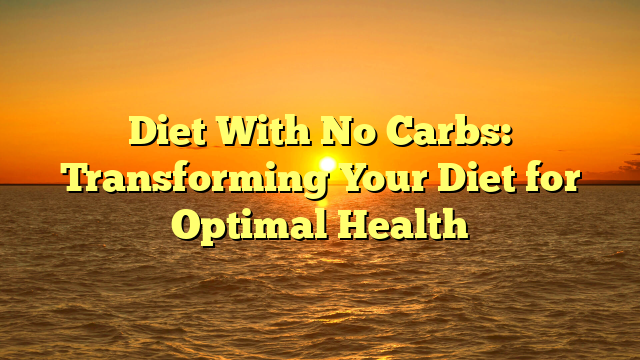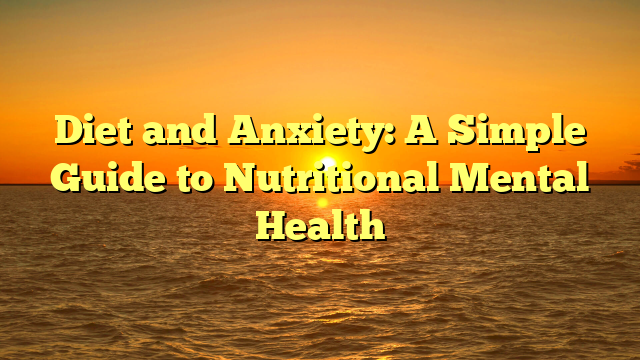Diet With No Carbs: Transforming Your Diet for Optimal Health
Are you tired of counting carbs and struggling to shed those extra pounds? If so, it might be time to consider a diet with no carbs. This revolutionary approach to eating has gained popularity in recent years for its ability to transform not only your waistline but also your overall health. Say goodbye to the bread basket and hello to a new way of nourishing your body. In this blog post, we’ll explore the ins and outs of a no carb diet, from how it works scientifically to the benefits it can bring. So, get ready to embark on a journey towards optimal health – all without sacrificing flavor or satisfaction!
What is a Diet With No Carbs?
What exactly is a diet with no Carbs? Well, as the name suggests, it’s an eating plan that focuses on drastically reducing or eliminating carbohydrates from your daily meals. Carbohydrates are found in various foods such as grains, fruits, starchy vegetables, and sugary treats. By cutting out these sources of carbs, you’re essentially forcing your body to find alternative sources of fuel.
Without sufficient carbohydrates to convert into energy, your body enters a state called ketosis. During ketosis, it begins breaking down stored fat for fuel instead. This metabolic state can lead to significant weight loss and improved overall health.
But before you jump on the no carb bandwagon, it’s important to note that not all carbs are created equal. Complex carbohydrates found in whole grains and nutrient-dense fruits and vegetables provide essential vitamins, minerals, and fiber that support optimal bodily functions.
So why would anyone want to eliminate them entirely? The answer lies in certain dietary goals like rapid weight loss or managing conditions like diabetes or epilepsy where controlling blood sugar levels is crucial. However, it’s important to consult with a healthcare professional before embarking on any extreme dietary changes.
In essence, a no carb diet involves limiting carbohydrate intake to near-zero levels while focusing on protein-rich foods like lean meats and seafood along with healthy fats from sources such as avocadoes and nuts.
By understanding what a no carb diet entails at its core level – restricting carbohydrate consumption for specific purposes – you can make an informed decision about whether this approach aligns with your personal health goals.
The Science Behind Diet With No Carbs: How It Works
When it comes to understanding the science behind no carb diets, it’s important to delve into how our bodies process carbohydrates. Carbs are broken down into glucose, which is then used by our cells as a primary source of energy. However, when we drastically reduce or eliminate carbs from our diet, our bodies enter a state called ketosis.
During ketosis, the body switches its fuel source from glucose to stored fat. This occurs because there are no carbohydrates available for immediate energy production. Instead, the liver breaks down fatty acids into molecules known as ketones. These ketones then become the main source of fuel for both the brain and body.
By following a no carb diet, you essentially force your body to tap into its fat stores for energy instead of relying on incoming carbohydrates. This can lead to significant weight loss and improved metabolic health.
Furthermore, reducing carb intake may also help stabilize blood sugar levels and improve insulin sensitivity in individuals with diabetes or prediabetes. It can also help regulate appetite hormones and reduce cravings for unhealthy foods high in refined sugars.
It’s worth noting that while eliminating carbs completely isn’t necessary for everyone, reducing intake can have numerous benefits for overall health and well-being. As always, it is essential to consult with a healthcare professional before making any drastic changes to your diet or lifestyle.
Understanding the science behind no carb diets provides insight into why they can be effective tools for weight loss and improving metabolic health. By entering a state of ketosis through carbohydrate restriction, our bodies switch their primary fuel source from glucose to stored fat. This transition not only promotes weight loss but also offers potential benefits such as stabilizing blood sugar levels and improving insulin sensitivity.
Benefits of a No Carb Diet
A no carb diet can offer a range of benefits for your overall health and well-being. By eliminating carbohydrates from your daily meals, you’re essentially cutting out processed foods, sugary snacks, and refined grains. This can have a positive impact on your weight management goals, energy levels, and even certain medical conditions.
One major benefit of following a no carb diet is weight loss. Carbohydrates are the body’s primary source of fuel, but when you restrict their intake, your body starts to burn stored fat instead. This can lead to significant weight loss over time.
In addition to shedding those extra pounds, many people report increased energy levels on a no carb diet. Without the spikes in blood sugar that come from consuming carbs, you’ll experience more stable energy throughout the day.
Another potential benefit is improved mental clarity and focus. Some studies suggest that reducing carbohydrate intake can enhance cognitive function and help alleviate symptoms of brain fog.
Furthermore, a no carb diet has been shown to improve markers of heart health such as cholesterol levels and blood pressure. By cutting out high-carb processed foods that often contain unhealthy fats and sugars, you’re promoting cardiovascular wellness.
It’s important to note that everyone’s body is different, so individual results may vary when it comes to the benefits of a no carb diet. It’s always best to consult with a healthcare professional or registered dietitian before making any drastic dietary changes.
Foods to Eat and Avoid on a Diet With No Carbs
When following a no carb diet, it’s important to be mindful of the types of foods you consume. While carbohydrates are restricted, there are still plenty of delicious and nutritious options available.
Focus on protein-rich foods such as lean meats like chicken, turkey, and fish. These provide essential amino acids that support muscle growth and repair. Eggs are also an excellent choice as they contain high-quality protein along with vitamins and minerals.
Next up is non-starchy vegetables. Load your plate with leafy greens like spinach, kale, and lettuce. Other low-carb vegetable options include broccoli, cauliflower, zucchini, bell peppers, and cucumbers.
Healthy fats play a crucial role in a no carb diet as well. Avocados are not only rich in healthy fats but also provide fiber for good digestion. Olive oil is another fantastic option for cooking or dressing salads.
On the flip side, there are certain foods you should avoid while following this type of diet. Foods high in refined sugar like sodas, candies, cakes,and cookies should be eliminated completely.
Additionally,pasta,rice,bread,and other processed grains contain significant amounts of carbs so steer clear from these staples too.
Fruit juices packed with added sugars can quickly spike your blood sugar levels so opt for whole fruits instead.
By making smart choices about what goes on your plate,you can adhere to a no carb diet while enjoying delicious meals that fuel your body properly!
Meal Ideas and Recipes for a Diet With No Carbs
When following a no carb diet, it’s important to get creative with your meal ideas and recipes. While it may seem challenging at first to eliminate carbs from your plate, there are plenty of delicious options that are both nutritious and satisfying.
For breakfast, try starting your day with a veggie-packed omelette or scrambled eggs cooked in coconut oil. You can add spinach, bell peppers, mushrooms, or any other low-carb vegetables you enjoy. Another option is to make a protein-rich smoothie using unsweetened almond milk, spinach or kale, and a scoop of protein powder.
For lunch and dinner, focus on incorporating lean proteins like chicken breast, turkey breast, fish or tofu as the main component of your meals. Pair them with generous servings of non-starchy vegetables such as broccoli, cauliflower, zucchini or green beans. Grilling or roasting these ingredients can bring out their natural flavors while keeping the carb count low.
Snacks are an essential part of any diet plan. Opt for foods like hard-boiled eggs, sliced cucumbers with hummus dip or celery sticks with almond butter. These snacks provide protein and healthy fats without adding unnecessary carbs to your intake.
Don’t forget about dessert! While traditional sweets may be off-limits on a no carb diet due to their high sugar content, you can still satisfy your sweet tooth with alternatives like sugar-free gelatin cups topped with whipped cream or homemade chia seed pudding made with unsweetened almond milk and stevia for sweetness.
Remember to stay hydrated throughout the day by drinking plenty of water infused with lemon slices or fresh herbs for added flavor. Herbal teas also make great zero-carb beverage options!
Get creative in the kitchen by experimenting with spices and seasonings that enhance the flavors of your dishes without relying on carbohydrates for taste. Garlic powder, onion powder,
and various herbs can take simple ingredients to the next level.
By incorporating these meal ideas and recipes into your no carb diet, you can enjoy a variety of delicious and satisfying meals while staying on track with your health goals. Don’t be afraid to get creative and try new things – you may discover some new favorite dishes along the way!
Tips for Successfully Transitioning to a No Carb Diet
Transitioning to a no carb diet can be a significant change for your body and lifestyle. Here are some tips to help you successfully make the switch:
1. Start slow: Instead of completely eliminating carbs all at once, gradually reduce your intake over time. This will give your body a chance to adjust and minimize any potential side effects.
2. Focus on protein and healthy fats: Since you’ll be cutting out carbs, it’s important to ensure you’re still getting enough nutrients from other sources. Include plenty of lean proteins like chicken, fish, and tofu, as well as healthy fats like avocados and nuts in your meals.
3. Experiment with low-carb alternatives: Luckily, there are countless low-carb substitutes available today that can satisfy cravings without derailing your diet. Try using cauliflower rice instead of regular rice or zucchini noodles instead of pasta.
4. Stay hydrated: Drinking enough water is always important for overall health but is particularly crucial when following a no carb diet. Not only does it help with digestion, but it also helps prevent dehydration during the initial adjustment period.
5. Plan ahead: Meal planning is key when embarking on any new dietary journey, especially one that involves cutting out an entire food group like carbohydrates. Take the time each week to plan out your meals and snacks so that you’re prepared and less likely to reach for unhealthy options.
By implementing these tips into your transition process, you’ll set yourself up for success on your no carb diet journey! Remember to listen to your body and make adjustments as needed along the way.
Potential Risks and Considerations with a No Carb Diet
Before embarking on a no carb diet, it’s important to understand the potential risks and considerations involved. While this type of eating plan can have numerous benefits for some individuals, it may not be suitable or sustainable for everyone.
One key consideration is the initial adjustment period. When you drastically reduce your carbohydrate intake, your body needs time to adapt. This can lead to symptoms such as fatigue, brain fog, and irritability. It’s crucial to listen to your body during this phase and ensure you’re getting enough nutrients from other sources.
Another risk is nutrient deficiencies. Carbohydrates are an essential source of energy and provide several vitamins and minerals. By eliminating carbs from your diet entirely, you may miss out on these vital nutrients if you don’t make appropriate substitutions.
Furthermore, long-term adherence can be challenging for many individuals. Completely cutting out an entire food group requires careful planning and dedication. It’s essential to find alternative sources of fiber while ensuring adequate protein intake.
It’s worth noting that no carb diets may not be suitable for athletes or those engaging in intense physical activity regularly. Carbs are the primary fuel source during exercise, so limiting them too much could impair performance.
Always consult with a healthcare professional before making significant changes to your diet or lifestyle—especially if you have any underlying health conditions or concerns about nutrient deficiencies.
Remember that every person is unique, so what works well for one individual might not work as effectively for another when it comes to dietary choices!
Conclusion: Is a No Carb Diet Right for You?
Making the decision to follow a no carb diet is a personal one, and it’s important to consider your individual health needs and goals. While a no carb diet can have many benefits, it may not be suitable or sustainable for everyone.
Before embarking on any major dietary changes, it’s always wise to consult with a healthcare professional or registered dietitian who can provide personalized guidance based on your specific circumstances.
If you’re looking to lose weight, manage blood sugar levels, or improve certain health conditions such as diabetes or epilepsy, a no carb diet might be worth considering. However, if you engage in intense physical activity or have high energy demands due to your job or lifestyle, eliminating all carbohydrates from your diet may not be practical.
Remember that every person is unique and what works for one individual might not work for another. It’s essential to listen to your body and make adjustments as needed. Finding the right balance of macronutrients that supports your overall well-being is key.
In conclusion, while a no carb diet can offer significant benefits like weight loss and improved blood sugar control, it’s important to weigh those potential gains against any risks or challenges associated with following such a restrictive eating plan. Ultimately (!), the best approach is finding an eating pattern that you enjoy and can sustain long-term while meeting your nutritional needs!
Keep in mind that achieving optimal health goes beyond simply cutting out carbs – incorporating regular exercise, managing stress levels, getting enough sleep, and staying hydrated are also vital components of overall wellness!
FAQ’s
1. Can you lose weight on a no carb diet?
Yes, it is possible to lose weight on a no carb diet. When you eliminate carbs from your diet, your body starts burning stored fat for fuel instead of relying on carbohydrates. This can lead to significant weight loss over time.
2. Are there any side effects of a no carb diet?
While many people experience positive results with a no carb diet, it is important to be aware of potential side effects. Some individuals may experience initial fatigue, irritability, or difficulty concentrating as their bodies adjust to the absence of carbohydrates. It is also crucial to ensure you are still getting all the necessary nutrients from other food sources.
3. Can I follow a no carb diet long-term?
It is generally not recommended to follow a strict no carb diet in the long term because it eliminates several essential nutrients that our bodies need for optimal health. However, some people may choose to adopt a low-carb or ketogenic lifestyle which allows for limited amounts of healthy carbs while still providing adequate nutrition.
4. Is exercise necessary when following a no carb diet?
Exercise is always beneficial for overall health and should be incorporated into any dietary plan, including one with limited or no carbs. Regular physical activity helps boost metabolism, maintain muscle mass, and improve overall well-being.
5. How quickly will I see results on a no carb diet?
The rate at which individuals see results can vary depending on various factors such as starting weight and individual metabolism. Some people may notice changes within just days or weeks while others might take longer before seeing significant progress.
6. Are there any alternatives if I find it challenging to completely eliminate carbs from my diet?
If eliminating all carbs seems too difficult initially, consider adopting an approach that focuses on reducing refined carbohydrates and processed foods while increasing intake of nutrient-dense whole foods like vegetables, lean proteins, and healthy fats.
Remember!
A registered dietitian or healthcare professional should always be consulted before making any drastic dietary changes to ensure they are safe and suitable for you.







